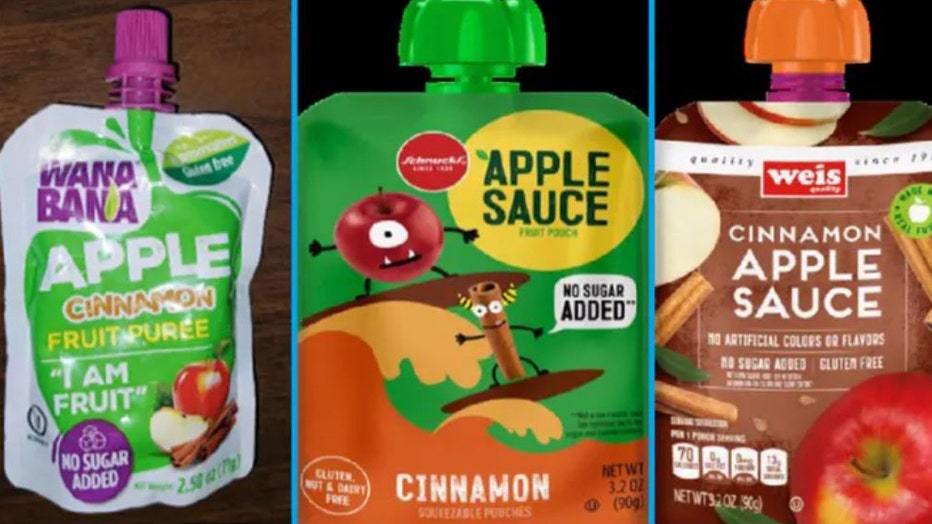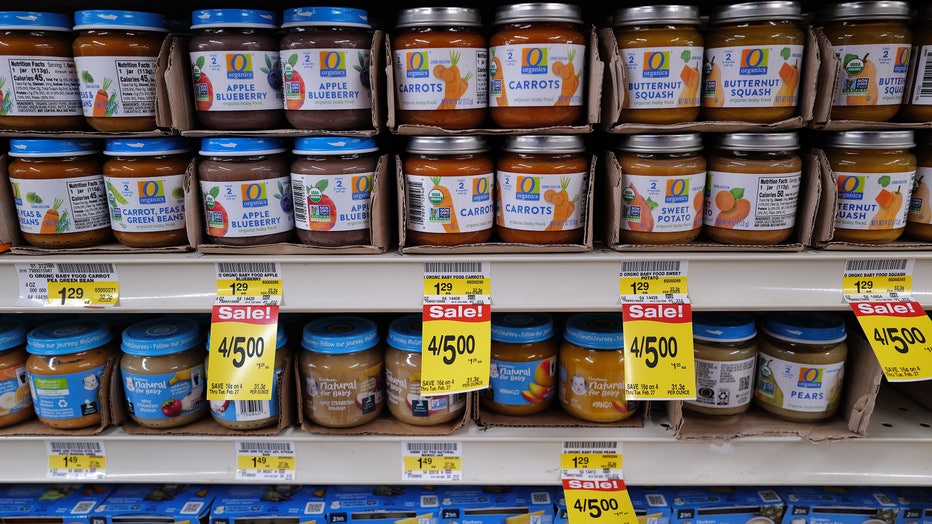After child lead poisonings, FDA asked to require testing for heavy metals in baby food
A group of state attorneys general is once again calling on the U.S. Food and Drug Administration to require manufacturers to test baby food for lead and other toxic metals.
The letter comes after hundreds of childhood lead poisoning cases in the U.S. were linked to recalled cinnamon applesauce pouches that were sold in stores nationally without being tested for toxic metals.
According to the attorneys general, current FDA policy allows baby food manufacturers to choose whether or not to test their products for toxic metals and other contaminants.
The attorneys general who signed the letter are from the following states: New York, Colorado, Connecticut, Delaware, Hawaii, Illinois, Maine, Maryland, Massachusetts, Michigan, Minnesota, New Jersey, New Mexico, Nevada, North Carolina, Oregon, Pennsylvania, Vermont, Washington, and Wisconsin.
RELATED: Chlormequat, pesticide linked to infertility, found in Cheerios and Quaker Oats, study claims
Massachusetts Attorney General Andrea Joy Campbell called the lack of FDA action "both a public health concern and a matter of environmental justice, as children from low-income communities and communities of color are disproportionately impacted by lead through exposure to lead-based paint, lead in drinking water pipes, and other sources.
"Lead in their food only exacerbates the existing inordinate and inequitable hazards these children face," a news release from her office states.
In 2022, that same group of attorneys general urged the administration to reconsider a petition it filed in 2021 when it asked the FDA to "drive down the levels of toxic heavy metals in food intended for babies and young children, including by issuing FDA guidance on finished product testing," FOX Business reports.
The FDA was not immediately available for comment.
Recalled applesauce pouches lead to lead poisoning

FDA expands investigation into apple sauce contaminated with lead. (FDA/Fox News)
In early November 2023, Wanabana LLC initiated a recall of its WanaBana, Schnucks, or Weis-brand apple cinnamon pouches – manufactured by Ecuador-based Austrofood – over elevated lead levels.
The recall was prompted after four children in North Carolina had "elevated blood lead levels, indicating potential acute lead toxicity," according to federal health officials, according to FOX Business.
It was later learned that the pouches also contained a high level of a different chemical – chromium – which can be toxic. Austrofood’s S.A.S. factory, which manufactured the recalled pouches, didn’t test for heavy metals.
The product was sold nationally through multiple retailers including Amazon, Dollar Tree and Family Dollar/Dollar Tree combination stores in addition to other online outlets.
The FDA has said that it has "limited authority over foreign ingredient suppliers who do not directly ship product to the U.S." due to the fact that their food undergoes further manufacturing and processing prior to export.
The FDA hasn't received any new reports of illnesses since late January when it received 90 confirmed complaints or reports of adverse events potentially linked to recalled product, Fox News reports.
RELATED: FDA recommends moving marijuana to lower-risk drug class: Key takeaways
The U.S. Centers for Disease Control and Prevention reported 287 confirmed, probable or suspected lead poisoning cases from 37 states in the outbreak first detected in October. At least one adult has reported high blood lead levels after eating the lead-tainted pouches, but the median age of those sickened is 1, the FDA said.
The FDA previously told FOX Business that one of the theories it was exploring "regarding the high lead levels in the recalled cinnamon applesauce pouches is the potential that the cinnamon contamination occurred as a possible result of economically motivated adulteration."
Last month, bipartisan lawmakers from the House Energy and Commerce Committee called on the FDA to detail in a briefing why it believes the lead contamination in the recalled applesauce pouches could have been intentional and the steps it has taken to investigate the matter as well as prevent future illicit food contamination in the supply chain.
‘Closer to Zero’: FDA’s plan to reduce heavy metals in baby food

Baby food is offered for sale at a grocery store on February 13, 2024 in Chicago, Illinois. (Photo by Scott Olson/Getty Images)
In January 2023, the U.S. Food and Drug Administration proposed new maximum limits on levels of lead in processed baby foods, such as pouches and jars.
It limits the concentration of lead in certain fruit, vegetable, yogurt, and other mixture products to 10 parts per billion. It would also limit root vegetable products (single ingredient) to 20 parts per billion and dry cereals to 20 parts per billion.
RELATED: FDA proposes new limits for lead in processed baby foods
The agency estimated that such limits could reduce young children’s exposure to lead in these foods by as much as 27%.
The guidance is part of the FDA’s ongoing Closer to Zero action plan to reduce exposure to arsenic, cadmium, lead, and mercury from foods eaten by babies and young kids. Such heavy metals can negatively affect a baby’s brain development and are among the most common metals that get into food, according to the U.S. Centers for Disease Control and Prevention and the American Academy of Pediatrics (AAP).
These heavy metals are found naturally in the Earth's crust and are also released into the environment as pollution that gets into the water and soil used to grow food, according to the AAP. The toxins can also get into food from food manufacturing and packaging.
Exposure from all sources "should be minimized," the AAP states.
This young age group was prioritized because "their smaller body sizes and metabolism make them more vulnerable to the harmful effects of these contaminants," the FDA states on its website.
The plan was announced in 2021, according to the letter from the attorneys general, but the attorneys general claim the FDA has since removed the deadlines it had posted for products to reduce levels of certain heavy metals.
FOX News and FOX’s Kelly Hayes contributed to this report.

